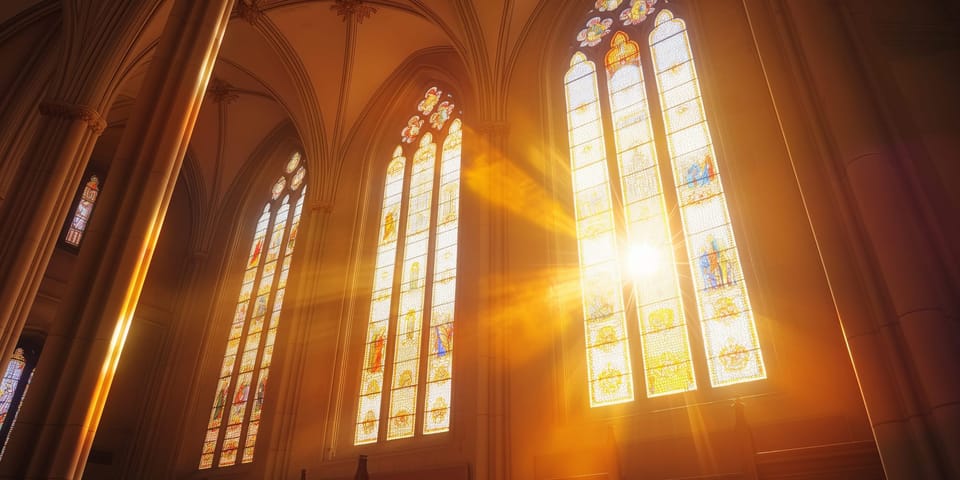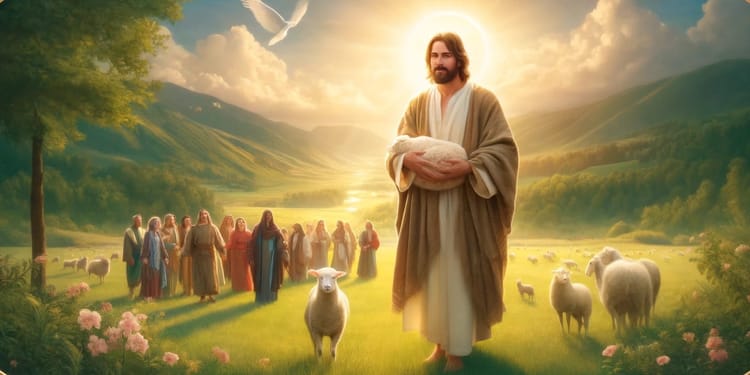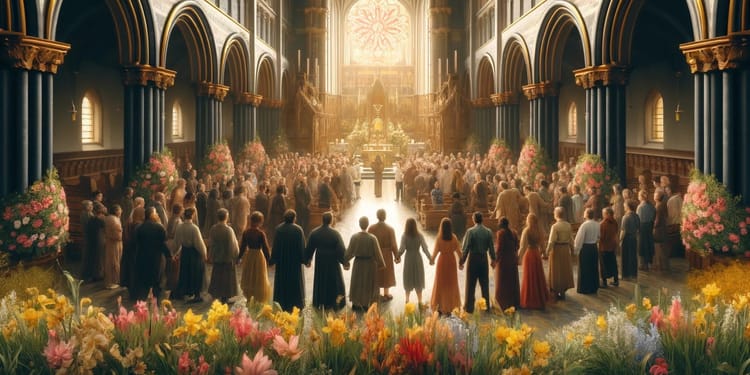Fairhaven Sermon 3-17-2024

During the fifth week of Lent, Pastor Peg Bowman delves into the theme "Seeds in the Sand," drawing inspiration from Jesus' words in John 12 and the prophecies of Jeremiah. Throughout her sermon, Rev. Bowman highlights how we are all like seeds in the sand, destined to bear fruit through the power of God and the resurrection of Jesus.
The sermon delved deeper into Jeremiah's time as a prophet in Jerusalem, where God repeatedly called His people to return from idolatry and false gods. Despite these pleas, the king, religious leaders, and those in positions of power did not listen. As a result, Jerusalem was attacked by the Babylonians, leading to mass deportations.
However, Jeremiah also prophesied about a new covenant where God's law would be written on His people's hearts. This promise would eventually come to fruition through Jesus' death and resurrection. Rev. Bowman emphasized the significance of this event in providing salvation, forgiveness, and the ability for all people to bear much fruit.
The sermon concluded by contrasting the Christian belief of an eternal personal relationship with God and the Greek/Roman belief of being star stuff with no conscious awareness in the afterlife. In summary, Rev. Peg Bowman's message encouraged everyone to embrace their role as seeds in the sand, trusting in the power of God and Jesus' resurrection to help them bear fruit and ultimately fulfill the new covenant promised by Jeremiah.
Transcript
Well, welcome to Lent Week 5. And before I get into the sermon, I wanted to mention a few other things that are happening this week. Well, today, of course, is St. Patrick's Day, which you all are very much prepared for.
This is wonderful. It's great. So happy St. Patrick's Day, on top of the mornin' to ya, right? And then this Tuesday is the first day of spring.
Yay. And then Wednesday, we remember the birthday of Mr. Rogers. And Thursday, we remember the birthday of J.
S. Bach. And Saturday is the beginning of the Jewish holiday of Purim. So if you have Jewish friends, you wish them a happy Purim on Saturday.
So a lot going on this week. Today is also the last of what I call the regular Sundays in Lent. Next week is Palm Sunday, which begins Holy Week. And as we move forward, drawing closer to the cross, the darkness and the heaviness of Jesus' last days begins to gather around us.
Our readings for today focus on the last few weeks of Jesus' life and on how those events tie -- of those weeks tie in with God's plan to save the human race from sin and self-destruction through the Messiah. So today's theme, Seeds in the Sand, is taken from Jesus' words in John 12. In these verses, Jesus is explaining to the disciple that he's about to die. And while Jesus does not mention the word resurrection directly in this verse, he hints at it by saying that a seed that lands in the soil will bear fruit.
But Jesus is just one seed. So where are the other seeds coming from? Well, that's all of us. At some point, each one of us will be a seed in the sand. And by the power of God and the power of Jesus' resurrection, we also will bear fruit.
That's the big picture message for today. Digging into the details, I'd like to start with our reading from Jeremiah. Since about the beginning of this year, I've been finding myself drawn to the book of Jeremiah. I've been reading it a lot.
And it might have something to do with the fact that worshiping idols was a huge problem in Jeremiah's time. And worshiping idols in a slightly different way is a huge problem in our society as well. So I've been reading to see how Jeremiah dealt with this, Jeremiah being the last prophet in Jerusalem before the city fell to the Babylonians. And when he was speaking God's word, Jeremiah predicted and then witnessed the fall of Jerusalem.
In Jeremiah's lifetime, God kept reaching out and reaching out and reaching out to the people of Israel, calling them away from false gods, calling them away from sacrificing their children and their futures to idols, calling them back to the one true and living God. And some people who loved God paid attention to Jeremiah's message. In Jerusalem, people like the members of the army, staffers in the palace, everyday people, they heard Jeremiah. But the king and the people in power and the religious leaders did not listen.
In fact, they ridiculed Jeremiah and threatened his life. So God gave Jeremiah the job of saying to the king and to those in power, This is your last chance. The Babylonians are coming. If you value your lives, surrender to the Babylonians.
They will take you to Babylon, but at least you'll be alive. That was God's message from Jeremiah and they still wouldn't listen. So the passage we heard this morning from Jeremiah sounds like a bit of good news and it kind of is in a way, but God is saying through Jeremiah, The days are coming when I will make a new covenant with the house of Israel and the house of Judah. I will put my law within them and write it on their hearts and no longer shall they teach one another saying, 'Know the Lord, for they will all know me.
' Sounds like good news. But the thing is, things didn't change. The people didn't listen and so these promises of God would be fulfilled at a later time. Also these four verses, as encouraging as they sound, are found in between two extremely dark passages.
The first passage before it, God is still asking the people to return to God and the people will not, and we hear Jeremiah speak a word that's usually connected with the birth of the Messiah. Jeremiah says, A voice is heard in Ramah, lamentation and bitter weeping, Rachel weeping for her children and refusing to be comforted, for they are no more. And we today recognize this verse from the Christmas story. Jesus was born King of the Jews and King Herod, being afraid for his throne, ordered all the male babies two years old or under to be killed.
So Jeremiah's words are looking forward to those days that are coming, but they also apply to Jerusalem back then. And then after our passage for today, God tells Jeremiah when the siege of Jerusalem comes, go out and buy a field. And again, the reason is that better days will come, but not right away. In the immediate future, the Babylonians are coming and God's word through Jeremiah is those who give themselves up to the Babylonians will survive.
In other words, surrender. Now these days, we don't fight wars by siege because most cities don't have walls around them these days. But Jerusalem was a walled city and attacking a walled city and trying to climb over those walls was very costly in terms of casualties. So rather than attack the walls and try to scale them, an invading army, in this case Babylon, would lay siege, which is devastatingly brutal.
The army would simply surround the city, the entire wall, and stop any and all traffic from coming in or going out, and then wait for the people inside the walls to starve to death. And when there was no one left alive to fight, the army would simply walk in and take the city. Now you can imagine this meant absolutely no mercy for civilians or for children or for the elderly, and a siege could take years. The suffering was unspeakable.
And this particular siege, the siege of Jerusalem, lasted about a year and a half before a handful of people who were still alive finally surrendered. The Babylonian captain found and murdered the king's family as they were trying to escape, blinded the king, took him to Babylon, and he left just a few of the poorest people still living to stay and work the land so that it wouldn't turn into a wasteland. Everyone else was deported to Babylon for the next 70 years. Why did God allow this to happen? Because the people had been unfaithful.
They had turned their back on God and God's covenant time and time and time again. They worshipped false gods. They had done all kinds of evil, including murder, and the people had refused over and over to return to the God who loved them. So what we see here is the price of loving and chasing after what is not God and what is not worthy of human worship.
So these days people don't usually worship physical idols, at least statues, most people don't anyway. I've met a few who do, but not too many. And truth be told, ancient people I don't think really worshipped those statues as much as they worshipped what they represented, the power to grow, the power to give life, the power to give wealth. That's what they were worshipping.
Today in our culture, I used to know a guy who thought that American Idol was an evil thing, because of the word idol. Personally I think that's one of the least of our worries, although there are some people who do idolize fame and money. But basically the definition of idolatry is making anything or anyone more important than God in our lives. To give a parallel, just think about what it means to have a faithful marriage.
When we get married, part of the marriage vow is to be faithful to our spouse. With God, when we become believers, our baptism and/or our confirmation includes similar vows of faithfulness to God, spiritual faithfulness. This is a relationship that is meant to last forever, and if there's anything in our lives that we love more than God or value more highly than God, that thing is an idol. So if we've committed our lives to God, what would ever motivate us to do something like bear false witness in court, or be violent, or be less than honest in our business dealings, or withhold friendship from someone who's lonely, or refuse to give food or clothing to someone who's in need? See this is why I can barely stand to watch the evening news anymore, you know, because I see our country and people around the world as well doing these things over and over and not listening to God, just like the people in Jerusalem wouldn't listen.
And I pray God's guidance and mercy over our world. At the same time, though, unlike in Jeremiah's day, we have the advantage of knowing the Messiah. God's promise to send a Savior is no longer future tense in our world. Jesus is present tense, always here.
And so as we come to the Gospel of John, we see and hear our Savior Jesus entering into his last days on earth. Just a few days before this reading, Jesus had raised Lazarus from the dead. And as a result, there were so many people following Jesus that the authorities in Jerusalem were getting nervous. Among other things, they were afraid that the Romans might see this huge mob of people and think that they're going to do some violence and come in and just kind of bring their army in and take over.
So the authorities in Jerusalem made plans to kill both Jesus and Lazarus. I always felt sorry for Lazarus. At the same moment, John says, A group of Greeks came asking to see Jesus. Now this was a sign that the time of including the Gentiles had come.
Both Jews and Gentiles will be part of Jesus' kingdom from now on, which also signals to Jesus that his time is short. And Jesus says, Father, glorify thy name. And God answers, I have glorified it and I will glorify it again. And so now with everything complete and every prophecy fulfilled, Jesus says, The hour has come.
My soul is troubled, understandably so, looking at the cross. Jesus knows what's coming and he's distressed by it. But for John and for Jesus, the focus is not so much on death as on what Jesus' death will make possible. Resurrection, ascension, forgiveness for God's people, and the bearing of much fruit.
Jesus' death and resurrection will bring salvation and a gateway into God's kingdom for many people in many nations. And Jesus' ascension will make it possible for all of God's people to have the Holy Spirit living in us, writing God's Word on our hearts, making it possible for us to live with God forever. Death becomes merely a doorway into an eternal relationship. Now this, by the way, is very different from what the Greeks and Romans believed back then about heaven and eternity.
Back then they believed, as many people do today, that the universe is not personal and that if we have any relationship to a next life, it will be only as what they call a fragment of the cosmos. There will be no conscious awareness. There will be no reunion with loved ones. The Greeks believed, as some of today's fiction writers sometimes put it, that we are all star stuff, eternal, but having no memory.
Christian teaching is completely different. Our God tells us that the Word was made flesh and lived among us, not in an abstract sense, but in physical reality. And that Word is Jesus, who we can love and be loved by in a personal relationship. In Jesus and through Jesus, we live forever, not as star stuff, but as actual people.
We are eternal beings, always human, and we will know our loved ones again when we see them again, and we will know Jesus when we see Him. This is what the church has taught and what God has taught from the very beginning of time. This is the new covenant that Jeremiah predicted. They will all know me, from the least of them to the greatest.
This is the fruit that grows from seeds in the sand. Amen.


